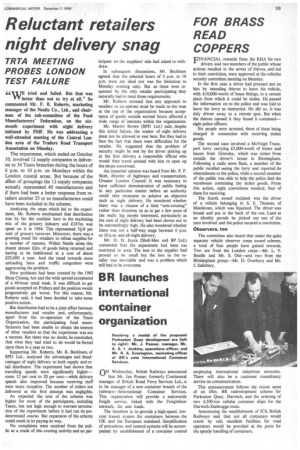Reluctant retailers night delivery snag
Page 61

If you've noticed an error in this article please click here to report it so we can fix it.
TRTA MEETING PROBES LONDON TEST FAILURE
64 Up tried and failed. But that was
V V better than not to try at all." So commented Mr. F. B. Roberts, marketing manager of the Nestle Co., Ltd., and chairman of the sub-committee of the Food Manufacturers' Federation, on the sixmonth experiment with night delivery initiated by FMF. He was addressing a well-attended meeting of the Central London area of the Traders Road Transport Association on Monday.
The experiment, which ended on October 10, involved 12 supply companies in deliveries to 34 Tesco branches during the hours of 6 p.m. to 10 p.m. on Mondays within the London coastal areas. But because of the effect of groupings the 12 supply companies actually represented 40 manufacturers and if there had been a better response from retailers another 25 or so manufacturers could have been included in the scheme.
Analysing the steps which led to the experiment, Mr. Roberts emphasised that distribution was by far the costliest item in the marketing mix of the grocery industry and £167m. was spent on it in 1964. This represented 3414 per cent of grocery turnover. Moreover, there was a growing trend for retailers to refuse supplies for a number of reasons. Within Nestle alone this meant almost Lim. of goods being returned and having to be redelivered at a cost of about 25,000 a year. And the trend towards more unloading bans and traffic congestion were aggravating the problem.
New problems had been created by the 1965 Shop Closing Act and the wide-spread acceptance of a 40-hour retail week. It was difficult to get goods accepted on Fridays and the position would progressively get worse. For this reason, Mr. Roberts said, it had been decided to take some positive action.
But distribution had to be a joint effort between manufacturer and retailer and, unfortunately, apart from the co-operation of the Tesco Organization, the participating food manufacturers had been unable to obtain the interest of other retailers so that the experiment was not a success. But there was no doubt, he concluded, that what they had tried to do would be forced upon them in a year or two.
Supporting Mr. Roberts, Mr. R. Beckham, of SPD Ltd., analysed the advantages and disadvantages of night delivery to both supply and retail distributor. The experiment had shown that travelling speeds were significantly higher— some 12 per cent to 20 per cent—while delivery speeds also improved because receiving staff were more receptive. The number of orders not delivered at the first attempt was negligible.
As expected the cost of the scheme was higher for most of the participants, including Tesco, but not high enough to warrant termination of the experiment before it had run its predetermined course. But expansion of the scheme could result in its paying its way.
No complaints were received. from the public as a result of this evening activity and no par
ticipant on the suppliers' side had asked to withdraw.
In subsequent discussions, Mr. Beckham agreed that the selected hours of 6 p.m. to 10 p.m. were not ideal nor was the limitation to Monday evening only. But as these were requested by the only retailer participating they naturally had to meet those requirements.
Mr. Roberts stressed that any approach to retailers to co-operate must he made to the man at the top of the organization because acceptance of goods outside normal hours affected a wide range of interests within the organization.
Mr. Martin Brown (SPD Ltd.) said, despite this initial failure, the matter of night delivery must not be allowed to rest here. But they had to face the fact that there were difficulties for the retailer. He suggested that the problem of security might be met by the driver picking up at his first delivery a responsible official who would then travel around with him to open up the shops concerned.
An impartial opinion was heard from Mr. P. F. Stott, director of highways and transportation, Greater London Council. It was necessary to have sufficient demonstration of public feeling in any particular matter before an authority could take measures to achieve an objective such as night delivery. He wondered whether there was a chance of a little "arm-twisting" rather than direction so as to get a few more of the really big people interested, particularly as the cost of night delivery had been shown not to be outstandingly high. He also wondered whether there was not a half-way stage between 6 p.m. to 10 p.m. and all-night delivery.
Mr. D. H. Joyce (Shell-Mex and BP Ltd.) contended that the . experiment had been too restricted in area. The loss to the supplier had proved to be small but the loss to the retailer was inevitable and was a problem which still had to be overcome.
































































































































































































